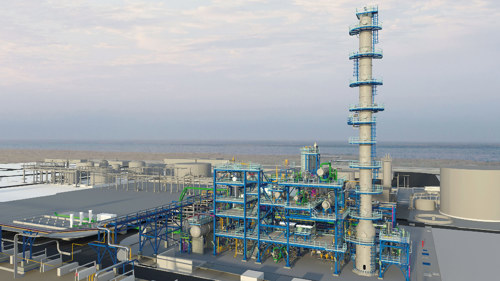Cepsa begins construction of the first chemical plant in Spain to produce the base for hydroalcoholic gels
- Its commissioning will provide a greater guarantee of supply in Spain of this product, made from isopropyl alcohol, which is essential for sanitary disinfection
- It will be the first plant of its kind in Spain to use green hydrogen and capable of replacing fossil fuels with sustainable alternatives, supporting the company's Positive Motion strategy to drive the energy transition
- The new plant will have a production capacity of 80,000 tons of isopropyl alcohol and will require an investment of 75 million euros
Cepsa continues to develop and diversify its chemicals business by starting the construction of a new isopropyl alcohol (IPA) plant, the first of its kind in Spain. This product is used not only in hydroalcoholic gels, but also in household and industrial cleaning products.
The new IPA plant, backed by a €75 million investment, will be located in Palos de la Frontera (Huelva) and will be the first plant of its kind in Spain to use green hydrogen and capable to replace fossil-based raw materials in the production of isopropyl alcohol with sustainable alternatives. This will expand Cepsa Química's range of more sustainable products, in line with Cepsa's Positive Motion energy transition strategy.

For José María Solana, CEO of Cepsa Quimica, the IPA project “is a very important step in our Next Chemicals in Positive Motion strategy. The plant will be linked to our Andalusian Green Hydrogen Valley, ensuring that our activities are fully in line with our commitment to advance the fight against climate change and accelerate the ecological transition. It will also strengthen Spain's supply autonomy in these types of products.”
This new plant will guarantee our country consistent and high-quality access to this essential product, which is critical to sectors such as the medical and pharmaceutical industries. It will also reduce our dependence on isopropyl alcohol-based disinfectants from third countries.
The Regional Minister of Industry, Energy, and Mines of the Government of Andalusia, Jorge Paradela, emphasized that Cepsa's new chemical plant in Palos is "a tangible example of how innovation, sustainability, and job creation can go hand in hand, driving economic growth and the well-being of European society." In Jorge Paradela's words, with this investment by Cepsa, "it is demonstrated that energy at competitive prices is a factor in industrial location," and he highlighted that it will contribute decisively to "Spain gaining strategic autonomy by being the first facility in the country to produce the raw material for making renewable-origin hydroalcoholic gel."
Isopropyl alcohol is also used as a solvent in the manufacturing of paints, coatings, and printing inks, as well as an intermediate in the production of key ingredients in the pharmaceutical, cosmetic, and agrochemical industries.
The new facility, scheduled for completion by the end of 2025, will have a production capacity of 80,000 tons per year. It’s estimated that approximately 400,000 hours of work will be required to build this new plant, including both direct and indirect labor.
Synergies with the Andalusian Green Hydrogen Valley. Cepsa's chemical business – and the new IPA plant – will benefit from its proximity to the Andalusian Green H2 Valley and the largest second-generation biofuels plant that Cepsa is building, as part of a joint venture with Bio-Oils, next to the La Rábida Energy Park in Huelva. The location of the new facility adjacent to the chemical plant and the La Rábida Energy Park will allow the three facilities to be highly integrated, creating strong industrial and economic synergies. In this regard, it is worth noting that the supply of acetone required for IPA production will come from Cepsa's chemical plant, thus increasing its added value. In addition, the hydrogen (raw material) will be provided by the Andalusian Green Hydrogen Valley.
From the start, the plant will be able to use both renewable energy and raw materials, in line with Cepsa's commitments and the development of its "Positive Motion" strategy. The energy supply (thermal and electrical) required for IPA production is thus planned to come from renewable sources.
The construction of this new plant will strengthen the new chemical industry in Spain and allow Cepsa to diversify its product portfolio, positioning the company as a leader in the Iberian Peninsula market and making it one of the main producers and references of isopropyl alcohol in the European Union.
In this regard, the company has been a global pioneer in the development of more sustainable LAB and phenol, which maintain the same technical properties as the traditional product, but with a lower carbon footprint. These products, called NextLab and NextPhenol, make up this new portfolio (Next), whose production is based on renewable and recycled raw materials and renewable energy use. Cepsa Química has also developed and validated a certification system for this carbon footprint reduction, complying with international standards in the field.






Comments